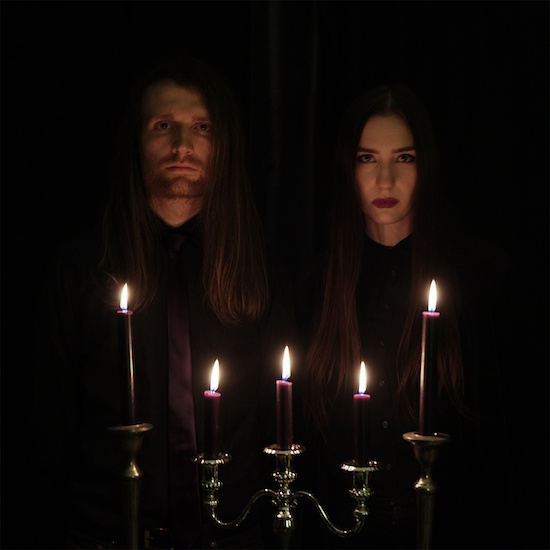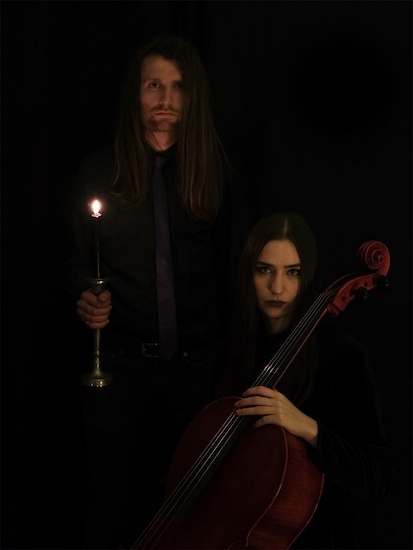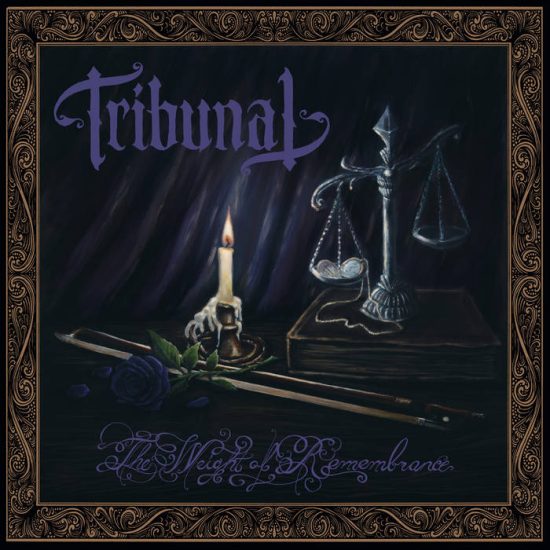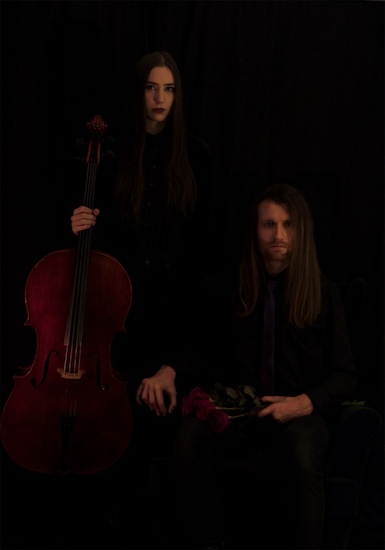
Photo by Liam Kanigan
(We thank Comrade Aleks for the following very engaging interview he conducted with Etienne Flinn and Soren Mourne, whose new album under the name Tribunal is out now on 20 Buck Spin — and we thank them too for their time and their music!)
Vancouver-based duo Tribunal was founded by Etienne Flinn (vocals, guitars) and Soren Mourne (cello, bass, vocals) in 2019. Their passion towards doom metal pushed them further and further until seven songs which they recorded with a few guest musicians drew the attention of 20 Buck Spin. Thus their delightfully elegant and mournful full-length album The Weight of Remembrance was released in January 2023, and has already got well-deserved positive feedback.
Tribunal preaches the mix of traditional doom metal with elements of death-doom, but Soren’s vocals and cello let both the band and the label use the “gothic doom” tag to describe this material. Okay, then let’s try to dig out what gothic doom means here with the help of Soren and Etienne.
******
Hi Soren and Etienne! Accept my congratulations – The Weight of Remembrance really kills! Did you spend all three years that passed since the band’s foundation in 2019 polishing this material?
Etienne: Thank you! It has been wonderful to see the album connecting with so many people.
We started writing the material for this record in the summer of 2018, starting with what would become “Initiation” and “Without Answer”. We continued writing material fairly consistently until we finished the album around mid-2020 when I completed “The Path” and rewrote the lyrics to “Without Answer”. There was more polishing and arranging done as we recorded the album through 2020.
Soren: While Etienne and I started writing together earlier, Tribunal evolved from a project to a band with the addition of our original guitarist and drummer in early 2019. Much of our energy turned to working through the songs with the band to prepare for live shows, and in doing so, the songs moved towards their final form. Most of the “polishing” in this period arose organically through months of playing through the tracks in our jamspace, which is where many of our songs really took shape. We are grateful to our original members for their role in bringing Tribunal to life.

Photo by Liam Kanigan
I see that both of you didn’t play in any metal bands before (according Metal-Archives). How was it to write your first album?
S.: I actually played bass in metal bands that haven’t made their way onto the Archives all throughout my teenage years. However, I did take a break from playing in any dedicated projects for a number of years, so Tribunal was my first foray into writing for quite a while. At the time Etienne and I started our collaboration, I was hungry for a creative outlet and had years of ideas pent up, so I was very keen to write.
Our collaborative dynamic evolved quite easily and I found that we both made each other’s work better, which created a lot of momentum. Tribunal was my first serious effort at composing, which has since become a great joy of mine. I am fortunate to be in a fruitful creative relationship that laid the groundwork for my skills to grow.
The writing process took a number of forms, each with their own challenges and pleasures, but was overall very enjoyable and fulfilling. Some of my favourite band memories are of long evenings trying different cello melodies over the same few bars for hours until we founnd the right one.
What were the main features which you wanted to express through Tribunal? What kept you focused through the whole process of composing the album?
E.: The original intention behind Tribunal was to simply write music and get out to perform on stage, with the particular features of the band arising naturally from that process. This is music for sorrow and reflection, but with an element of escapist fantasy and headbanging fun as well.
Much of the music was composed organically, without much focus on completing a full record. I honestly don’t know if we realized how long the songs we were playing had become, and so once we turned our minds to creating an album I think we were surprised to see that we had more than enough material to fill one. The closure of offices and venues during the pandemic did give us more time to focus on tracking the record once recording began in the summer of 2020.
S.: Tribunal serves as a much-needed creative outlet in my life, so I treasure all the time I’m able to spend with it. I am particularly grateful to have had a project of this scale to work on throughout the pandemic. It was invaluable to have something that we could tangibly make progress on during a period when other markers of the passage of time were largely absent.
Tribunal performs a kind of traditional doom with cello, some clean, some extreme vocals, and female vocals. And all these elements sound as integral parts of The Weight of Remembrance. Didn’t you catch yourself thinking that there could be too much for one album? How easy was it to integrate all of your ideas in these songs?
E.: The elements that make up the record came together quite naturally for us, arising fairly directly from our individual abilities and interests. We both love doom metal, with Soren gravitating towards more traditional and epic styles and me preferring more gothic death-doom, so the two styles blended when we began composing doom metal together.
Similarly, I’ve always loved bands who blended clean and harsh vocals, and neither of us were necessarily keen to take center stage as a “lead singer”, so the vocal combination seemed logical. We didn’t use cello as a key ingredient initially, but as the music we wrote started to trend to more gothic regions the instrument felt necessary to enhance the music that was taking shape. While these are many elements, I believe they fit together naturally and produce an album that feels like a diverse yet coherent whole.
Drums were recorded by guest-musicians, and I wonder why you didn’t record it just through a PC? I wouldn’t ask but I think that it was October or November when I heard two albums with programmed drums. Is it a question of true metal ethic for you?
E.: This would be a combination of skills and ethic for us. Programming drums may be simpler in many ways, but it still requires a great deal of skill and knowledge to do well. I program drums for our demo recordings, but I certainly would not include drums of that quality on our records.
At the same time, we do love keeping our music organic and would definitely always prefer to work with a drummer for that reason. Indeed, we are rare among gothic bands in that we perform live entirely without backing tracks, with live cello from Soren and piano and other soundscape elements from our live keyboardist Dallas.
S.: I have no ethical qualms with electric percussion— the extent of my Summoning collection makes that quite clear. However, we are a band that plays live, so for us, it is ideal to have the drums on the album reflect our live sound and to form relationships with people we intend to play with. The main drummer on the album, Julia Geaman, is an excellent musician who we have been working with for a number of years now. She recorded drums for the album in 2020 and has played drums with us live since. The additional drummer on “Apathy’s Keep”, Magdalena Wienski, was our original drummer who we planned to record with, but she had to leave the band and the country shortly after recording this track. We wanted to honour her contributions by incorporating her takes into the track along with Julia’s.
Also, we recorded everything but the drums ourselves through an interface on our computers, so we figured we could treat ourselves to an actual drummer recorded in a proper studio.

The Weight of Remembrance is tagged as a “gothic doom” album. This term is a kind of contradictory one, as you know there were “gothic rock” and “doom metal” genres in the beginning… Let’s say… Sisters of Mercy and Trouble! And if we’d try to combine these two then we’ll never get My Dying Bride… Stillborn probably or maybe Jack Frost but not My Dying Bride. So what does “gothic doom” mean for you?
E.: For me, gothic doom ties to the sound of bands like My Dying Bride, which combine the heft of doom with the romance and elegance of gothic music. Ultimately, our intention was to produce music that was sad, slow, and heavy, and I think this record captures that sound quite well.
S.: Well I love classic goth rock and the other directions goth music took in the ’90s and beyond, so I think those sounds certainly find their way into my writing. We didn’t self-identify as gothic doom until others started describing us as such, which has been a relatively recent development, but the label has grown on us. I was somewhat resistant at first because of the term’s ambiguity and the potential assumptions that may be made about our sound. Namely, I was concerned about the association between “gothic metal” and what is often termed “beauty and the beast” vocals–a term I really dislike–given that I am a woman doing vocals. I am very influenced by traditional doom with belting vocals and heavy riffs, so this distinction felt important to me.
However, as Etienne said, there is a certain dark romanticism and gothic aesthetic woven throughout our work, particularly in the cello and key parts. I think my interest in goth music as well as my classical background naturally bring this dimension to our sound. Ultimately, I think the genre label draws audiences who may connect with our sound even if it is not what they expected, which is all we can really hope for a label to do.
Tribunal has its own recognizable sound, the combination of features which you successfully integrate in The Weight of Remembrance. Do you feel that you’ve found the balance here? Or would you change something during the composing of new songs?
E.: We are quite pleased with the sound we’ve found with The Weight of Remembrance. That said, I think we will continue to explore our sound with our new record, integrating a mixture of our vocal styles and instruments such as cello and keyboards. We wrote much of the debut with a 4-piece band in mind and only started working with a keyboardist and live cello relatively late in its development, so we are writing the second album with those instruments in mind from the beginning.
S.: I have been writing with composing software more than on the debut, which has lent itself to building more complex harmonies using the full palette of instruments at our disposal. My vocal technique has also improved thanks to practice since our earlier work, which was written with a more limited range in mind, so I am interested in pushing myself more as a vocalist on our next record. We are always trying different approaches to collaboration and I expect our next album to feature more blended songs that are not as clearly Etienne’s or mine.
We are also taking a more intentional approach to lyrics with our next album. Etienne and I took some time to discuss concepts we are both interested in exploring, such as justice and morality, and how the album will approach them.

Photo by Liam Kanigan
Well, I didn’t find the songs’ lyrics, so I’d like to clarify – what’s your message behind The Weight of Remembrance?
E.: The Weight of Remembrance is composed of songs we wrote over a number of years, without a clear singular message or theme in mind. However, the record as a whole is quite introspective, with many of the songs touching on the changes that come with the passage of time, and the distance between who we are and who we think we should be.
S.: Given that the project began as a creative outlet, it is quite reflective of different internal struggles we both dealt with over the course of its writing. There are some common themes that arose naturally through both of us working through similar stages of life, but our unique challenges and conflicts are reflected in our respective lyrics. For example, “Apathy’s Keep” depicts my battle with the guilt of not engaging with the struggles of those in need to the extent I feel I could or should, while “Without Answer” draws on Etienne’s experiences of losing religious faith.
You have a very impressive album, you have a proper promo video, and some positive – I believe – feedback. What’s your next step as the band? Will you try to support the album’s release with more gigs or will you return to composing new material?
E.: Thank you! It has been a long road to finally releasing the album and we are still enjoying the experience of finally having it out in the world to be heard by others.
For next steps, we just completed a terrific set of shows in British Columbia with Mares of Thrace, and are plotting to journey slightly further afield in the summer after our appearance at Covenant Festival in Vancouver. We are also hard at work on our second LP, which is already beginning to take shape.
S.: We are very grateful to 20 Buck Spin for their trust and support in bringing our album to such a wide audience. Our partnership has opened new doors for us and we hope to take full advantage of the opportunity.
https://www.facebook.com/TribunalDoom/
https://listen.20buckspin.com/album/the-weight-of-remembrance

Thanks for this interview. The Weight of Remembrance Is easily a top album of the year.